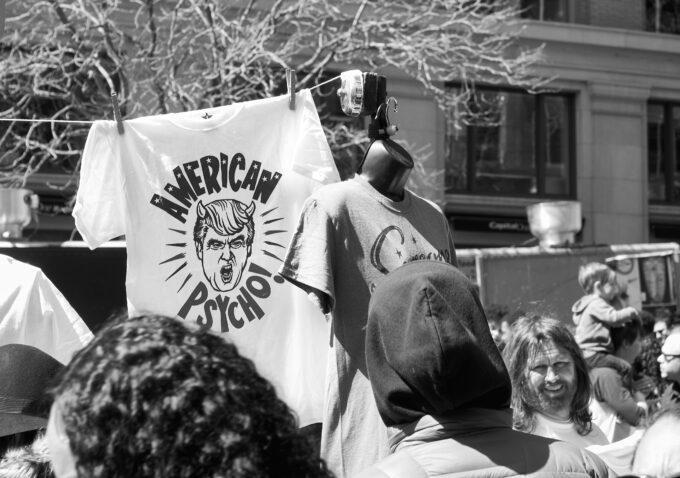
Trying to Repair a Room in a House Still Burning
Published on http://www.counterpunch.org
74 million Americans voted for Donald J. Trump in the 2020 election with a turnout of close to 67% of all eligible voters, the largest in over a century. Although Biden attracted some 80 million votes it seems clear that the driving passion to come out and vote had Trump at the center. Passionate Trump supporters on one side; passionate anti-Trump supporters on the other side.
With Trump gone . . . Wait. What is it about Donald J. Trump that draws so many to him, rivalled now probably only by TikTok’s 16-year-old, Charli D’Amelio who has 100 million minds she passionately influences? Are we dealing with a supra-rational bond between Trump and so many that doesn’t leave us, making him in Influencer whose influence is beyond our comprehension?
There’s much now that seems almost beyond conceivability. Take the notion that the science of climate change or pandemic doesn’t hold up against one’s personal review, or that “almost a million and a half Americans will be represented in Congress by people who support a community bent on proving that President Donald Trump is waging a holy war against a high-powered cabal of child traffickers and blood-drinking Satanists that includes prominent Democratic politicians and Hollywood celebrities.” (Kaitlyn Tiffany, “QAnon is Winning,” The Atlantic, Nov. 5, 2020).
In Senatorial runoff important to both parties, Trump supporters are convinced that this is “another fraudulent election with rigged voting machine & fake mail ballots” and should therefore be boycotted. These Republicans are following pied piper Trump as he throws his own party’s leadership in the Senate under the bus in his cracked and manic pursuit of overturning what this exceptional democracy has always been proud to call “the will of the People.”
leadership in the Senate under the bus in his cracked and manic pursuit of overturning what this exceptional democracy has always been proud to call “the will of the People.”
What a President Biden would face is 74 million as deeply tied to Trump in ways we cannot reach, leaving those not under the spell in a position similar to convincing those waiting for an extraterrestrial spacecraft following Comet Hale–Bopp that it wasn’t coming.
In short, we are positioned “where counsel cannot shake the fabric of his folly.” (The Winter’s Tale)
There’s another positioning not to be ignored, another reality that the 74 million share which about 80% of the whole population share. And this is an area in which the fabric of folly can be shaken and changed, or, at least an attempt can be made.
Some 74 million Americans somehow felt themselves in need of what Trump offered, or perceived themselves needing a response to conditions that angered them, and saw Trump as their response to all that. A litany of inequities and injustices created by an inequity and injustice producing economics, an economics of money itself being producer and product and labor cast into the darkness, has remained opaque to both parties who have supported this. Republicans have fully embraced the neoliberal offensive in which money creates reality and Democrats have responded with welcoming diversity within that reality. Now we are to believe that the pandemic has brought a marked clarity to us all.
Both political parties have united before Trump as a Republocrat Party in their loyalty to a globalism that is a bullshit front on every level but the level of global supply chain, “a magical formulation that is meant to make us believe capitalism has an organized nervous system we can study.” (Jonathan Sturgeon, “The Supply Chain Gang,” The Baffler, Sept/Oct 2020) That “organized nervous system” has proven itself in this time of pandemic as organized only toward a rapacious looting of most of the globe’s workers, wages and resources by the financial-digital domination of a few. It’s not organized toward equitable, non-competitive humanitarian relief.
This global supply chain is a new millennial version of imperialist colonization, this time by finance and algorithm, not by military might but by the violence to both economic justice and human faculties of absorption and comprehension. “The all-encompassing web of algorithmic automatons pervading the sphere of financial capitalism is an attempt at mapping and subjecting the general intellect.” (Franco Berardi, And: Phenomenology of the End)
What the pandemic has brought forward clearly is that 74 million Trump voters were as much provoked by a very real organized precarity creating system as deceived into believing Trump was fighting that system for them.
Much lunacy has emerged from that deception. The villain of a Deep State and a “daily fight to deconstruct the administrative state” unfortunately targeted a possible remedy as the illness. The federal bureaucracy pales in terms of its bureaucratic web compared to the arcane labyrinthine ways in which “the immersive web of shared simulated experience,” a synthetic life in the hyperreal, and the profit, competition and growth imperative have in concert displaced our own subjective processes of reasoning, imagining, and sensing.
Whether all Biden voters voted for him not because he was the only alternative to Trump but because they believe government wasn’t a problem but a solution remains to be seen. It will take the concerted effort of all three branches of government to reach Trump’s millions by alleviating those conditions of financial-algorithm domination, by exposing the magic of the global supply chain that seems to effectuate that dominance in ways as uncontestable as the Roman empire’s global supply chain.
However, if all such efforts have to be measured by the goal of economic and technological expansion then success remains where it is now, the kind of success that brought us Trump, the kind of success that brought us apocalyptic fires on the west coast, a kind of success that faced this Coronavirus pandemic with a “every state on its own” chaotic response.
One of the many problems Biden will face is the fact that those who have joy in their success are invariably in those positions of power in which change must be initiated. In short, they lack incentive, or, at best, we need to rely on the conscience of their privilege.
“How can you know what the local problems really are if you don’t share them?” Elvia Wilk’s asks in an attempt to awaken us “from the cosmopolitan daydream” that a professionalized, meritocratic, gentrified mobile class has been in while deeming the U.S. a “base” among so many others around the globe. Ironically, those economically positioned to escape the cultural clashes and indispositions of multi-culturalism and diversity don’t hang with or remain long around what the immobile-cashless must face. “Have money will leave” set are not confined to one party, just as a wealthy lifestyle has no politics. That’s the sort of sharing level the country is at.
Those enjoying the munificent returns of working at home within our digitized finance capitalism were already well gated and sheltered from the ungentrified precariat. “It is only when those who take their security for granted are suddenly made vulnerable, precarious, that they slam up against the violence of the systems they have been benefitting from all along.” (“The World of Yesterday,” The Baffler, Sept-Oct 2020)
It seems fair to say that most of Trump’s 74 million have been “up against the violence of the systems.” I say this because the intensity of their attachment to Trump as well as the intensity of their vehemence and distrust points to equally intense causation. It’s both sad and tragic that “the system” has been incorrectly identified by them and that Trump, their designated savior, has been feeding and living grandly at the heart of a domination that leaves their well-being vulnerable and precarious.
The pandemic has given the title “essential workers” to all those who serve a wealth and professionalized meritocratic elite. Mutual aid and sharing have not been observable in the U.S. pandemic response, perhaps because there’s not much interest in other people, following Margaret Thatcher’s rule of doing you first and leaving others to their own regard. The attitude that there is no such thing as society, announced happily some forty years ago, as no more than a disembodied imaginary compared to your personal being, was embedded in the American mass psyche about the same time that government “by the people and for the people” graduated from problem to a dark empire that needed to be “deconstructed.” That’s from Reagan to Bannon in some forty years.
Is there much room for Biden to move toward his quasi-socialist peers in the Democratic Party, to a sense that mutual aid and not the ferocity of winners/losers is the ticket?
It seems clear that such would have been the better path to take during this pandemic. But once again, the severe wealth inequities existing before the pandemic didn’t push the “We have the means to be mobile” set of Americans from just jumping ship, or from viewing the pandemic as just another crisis opportunity to display winning ways. The “essential workers” who served, delivered, nursed, picked, painted, built, drove, rescued and policed, who worked because they needed the money though their lives were endangered, may have regained a place at the labor/capital table that lost leverage in a global economy disinvited them. I’m very awake to that. The new precariat class created by pandemic along with our valiant “essential workers” may work “fraternité” into the American mass psyche. But cash mobile gentrifiers, say from Brooklyn, the “New Paris,” escaping to Montana and the Dakotas may instill as little “fraternité” in those people as they did for the Brooklynites they invaded.
The pandemic did disclose that we are all in this together, but it also disclosed that a class whose work is never site-bound and who are cash-mobile went through a different pandemic than the “essential workers.” In effect, the pandemic didn’t hide the divide between the privileged and those not, regardless of how “woke” the consciousness of the privileged may be.
The American mass psyche is very far from dropping their Ayn Rand and picking up their Kropotkin. Emerson’s “Self Reliance” was, among many notions, a gateway to the mantra of assuming personal responsibility, even when, as happened, most of the country stood innocently by when ferocious, high flying Wall Street financial gaming led to the 2008 Great Recession, or when half the country has stood by helplessly while our President does all he can to tear down all efforts to mitigate the effects of global warming, effects that threaten our own extinction as well as “the lower orders,” who have been since Genesis helpless victims of human domination.
At one point do we personally assume responsibility for our cherished system of checks and balances’ failure to stop or even impede Trump as he rolled over it and continues to do so even after losing an election? At what point should we assume personal responsibility for not silencing our President when he asserted his epidemiological knowing as superior to Dr. Anthony Fauci, his climatological knowing as superior to Dr. James Hansen’s? What carries on outside our own personal will and therefore is not a matter of assuming personal responsibility are not cockamamy conspiracies. Our personal responsibility presumptions as well as our personal opinion presumptions stand like stone walls preventing us from seeing the financial and digital webs within which both our lives and our ways of knowing, free of algorithms, are ensnared.
The fact that Biden’s economic team are labor economists and not revolving door Goldman-Sachs and Citigroup priests of Capital is a good sign but whether policies initiated can convert a growing xenophobia in the American mass psyche into the sort of mutual aid society Peter Kropotkin described seems, given the acquiescence to Trump’s immigration policies and the divisions of human worthiness nurtured by meritocracy, gentrification and Trump’s spewing of hate on Twitter for four years, probably unlikely.
There’s something contained in the illusions of personal autonomy and the illusions of personal choice that make no room for other people. What Biden inherits is a community that is imagined, paradoxically, as personal and not societal, a self-declared government that has been an oligarchy since Reagan did the re-arranging, a nation whose economics has globalized/trans nationalized and left 80% of its citizens on the extinction pile, and a web of algorithms converting human life to synthetic life within which was are, perhaps, irretrievable immersed.
The cabinet Biden has so far chosen to retrieve us from such immersion represents the diversity of the country itself, although we must acknowledge that a complete representation of difference would include not only Trump’s 74 million but a dominating financial-digital sector. A diversity of race, color, gender, ethnicity and so on reflect a kind of difference denied for too long but we cannot fool ourselves into thinking that recognition here elides those divisive differences that Biden must face, differences and diversity excluded but not silenced.
What the pandemic and the presidential election and our responses to both have revealed are forces heretofore unrepresented in any Presidential cabinet of any composition: a global chaining of a financialized capitalism and a digitalization which instrumentalizes this form of capitalism’s efficiency and control; a displacement of human faculties of constructing meaning and understanding by the “synthetic logic of the algorithm,” leading to what Berardi calls a “neuro-totalitarianism;” and the proven threat of the info-sphere of social media to transmit lies, bullshit and crank at vastly more attracting levels than the pain staking pursuit of meaning that is required now when at every point reality must be disentangled from a synthetic hyperreality.
All this will still be burning on the day of Biden’s inauguration, countered I’m sure by a rally Donald J. Trump will hold at Mar a Lago.














